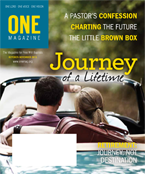
October-
November 2013
Journey of a Lifetime
------------------
|

Sudden Wealth: Blessing or Curse? (Part Two)
by Bill and Brenda Evans
“There’ll be no surprises,” we said during the inheritance
conversation with our three sons.
All legal documents were in order: updated wills, powers of attorney, living wills, and a Free Will
Baptist Foundation charitable remainder trust to
benefit our favorite ministries. We also said that
we had saved and grown our financial resources to fund end-of-life needs. We showed them our plans.
Finally, we got around to inheritances and dropped the Big If on them: “If anything is left after the Lord’s work and after the healthcare, it will be yours.” Our sons laughed, because they knew, as we did, that what’s left may be the nickel-and-dime stash one of us has secreted away…and there’s only one key. Or the odds and ends—mostly odds—stuffed into boxes in the attic, or maybe, just maybe, some of the green stuff.
We didn’t skitter around the problematics either: if our lives are short, they’ll get more; if long and we require institutional healthcare, they’ll get less. We wanted open dialogue, and so much of the conversation was questions and answers, opinions and responses. It ended up being, as it should be, a give and take between the two of us and our heirs. At the end, our sons thanked us for the conversation and said it was a good thing for both them and us. We agreed.
We are not saying that inheritance conversations are easy. They can be emotional landmines, with awful explosives just waiting to be stepped on, but the best way to deal with landmines is to figure out how to spot them and dig them up ahead of time. We did that and want to share some of the landmines we found.
First, your net worth makes a difference.
A high net worth means sudden wealth for your heirs; a low net worth means they may have to pay for your healthcare as long as you live. Either way, they need to know ahead of time. Sudden wealth can be a blessing or a curse. We dealt with that in Part 1, so revisit that article if you need to. But too little also impacts your children, and they need time to prepare for that as well. Have those conversations.
Second, privacy about money is not always good, especially when it comes to our heirs.
All the experts whom we have read agree with us on that. Veronica Dagher, for example, a columnist for Wealth Management at WSJ.com says that avoiding the inheritance conversation causes “confusion, mistrust and leaves heirs unprepared.” The point is that surprises, whether negative or positive, are bad, and preparation, for both the giver and receiver, is good.
Take this example: you are a prosperous business owner, and you would like to pass the business along to your three children, but only one of them is currently involved. The other two don’t seem to care who gets it. Don’t believe them. Your children are human. When inheritance time comes, jealousy, greed, distrust, and what-is-right-and-fair suddenly jump to the front. Count on it.
Don’t leave your heirs in that mess. Have those conversations, perhaps many of them. Sort it out as happily as you can, but don’t think you must please everyone. God has given you what you have, and you are responsible to leave it behind wisely at death. You are the one who counts most, so do what you must do and make it legal ahead of time.
Third, the larger the bequest, the more urgent is the need for communication.
A 2012 study by U. S. Trust indicated that more than half of high net worth parents had not fully disclosed their wealth to their children. Why? Some already have shallow or broken family communications and wealth magnifies that brokenness along with other family problems, according to Vic Preisser of a California family-wealth consultancy. Wealthy parents also worry that they will spoil their children or make them lazy and dependent, so they conceal the extent of their wealth.
Jim Grubman, a veteran family-wealth counselor, has watched that silence backfire. “There are so many horror stories,” he says, from deer-in-the-headlights paralysis to uncontrolled spending, isolation, addiction, and depression. Preisser recommends that families develop a mission statement regarding money and its appropriate use. Stories are good, too, Preisser says, especially those that give children perspective about how that wealth was created and conserved, or what money means (or doesn’t mean) to the family.
Fourth, conversations about inheritances are opportunities to demonstrate our values.
Nathan Dungan, founder and president of Share Save Spend, recommends that parents begin early to identify and articulate money values. To us, Dungan seems to propose a say-and-see model: speak your values but model them as well. For example, he advises setting short- and long-term goals in sharing, saving, and spending. Then, he says, put those goals into practice with values-based allowances for small children, part-time jobs for mid-teens and older, budget instruction and tracking, and family philanthropy projects. These, along with an annual summit to discuss and review money goals, will build heirs’ confidence and competence in finances before the money is theirs alone.
Nancy Armstrong, senior wealth dynamics coach at Ascent Private Capital Management of U. S. Bank, says parents need to keep saying it aloud: “Yes, we are wealthy....but we are even richer in terms of who we are as a family.” The aim is to both speak and model your values.
To us, an inheritance conversation is, among other things, one more opportunity to show both verbally and concretely what money does and does not mean to our family. Any way you look at our own legal documents, you will see that our sons—whom we love dearly—are in third place.
-
First, we will leave money to various Free Will Baptist ministries through a charitable remainder trust at Free Will Baptist Foundation, established long before we had the inheritance conversation.
-
Second, the two of us will pay for our own upkeep and health care as long as there is money, house, land, truck, or junk in the attic left in our names. We will deplete it all if we have to and then find a way to live out our lives on whatever our income is. In other words, we don’t plan to hide money or give it away early to our children so we can count on government agencies to pay for our end-of life healthcare.
-
Finally, whatever is left at the end will go to our sons, their wives, and our grandchildren, our precious heritage, reward, and crown from the Lord.
Veronica Dagher says two topics are really tough for parents to talk about. You guessed them: sex and money. You know by now that we’re not asking you to talk about sex. Here’s what we are asking: talk about money; specifically, have that conversation. Make your child’s inheritance, large or small, a blessing not a curse.
About the Writers: Bill Evans, former director of the Free Will Baptist Foundation, lives in Catlettsburg, Kentucky, with his wife Brenda, a retired English teacher. Visit www.fwbgifts.org for more information on planned giving that benefits your favorite ministry. |
|

